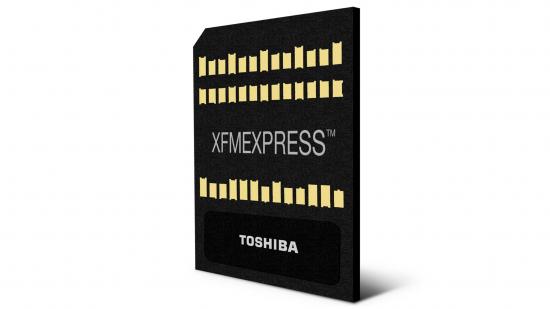Toshiba has announced a new form factor for PCIe NVMe SSDs at the Flash Memory Summit in Santa Clara that could see the end of soldering drives into laptops and other compact devices. The XFMEXPRESS form factor is just 14mm x 18mm x 1.4mm in size, but is capable of a full PCIe 3.0 x4 connection utilising the super-fast NVMe interface.
The XFMEXPRESS design is a rather familiar shape, leveraging a look not all that dissimilar from an SD card. However, it will utilise a new socket for motherboard connectivity that will allow an SSD to be removed and replaced without hassle. Toshiba has specifically kept the z-height to a minimum to make this new form factor attractive to the light and thin device market.
We’re hoping that means the days of soldered NVMe solid state drives will be over. This has been a technique implemented by a couple major OEMs in recent years to attach sleek, super-fast flash memory into ultra-thin laptops, but has left consumers with no upgrade path or option in the event of a catastrophic SSD meltdown.
But the XFMEXPRESS platform still has some ways to go before it stands a chance at becoming ubiquitous within the industry. To help things along, Toshiba has ensured its latest form factor is agreeable to modern 3D flash memory standards and those expected to take precedent in the foreseeable future.
And since we’re talking about stacked flash, Samsung just announced it has cracked 100+ layer 3D TLC NAND flash and already has high-capacity SSDs heading to production en masse.
It’s also planning to roll out an updated variant capable of PCIe 5.0 bandwidth once this interconnect specification is out in the wild. For now, it’s only PCIe 3.0 capable, but this may change sooner rather than later now that AMD Ryzen 3000 has introduced PCIe 4.0 into the mainstream market.
